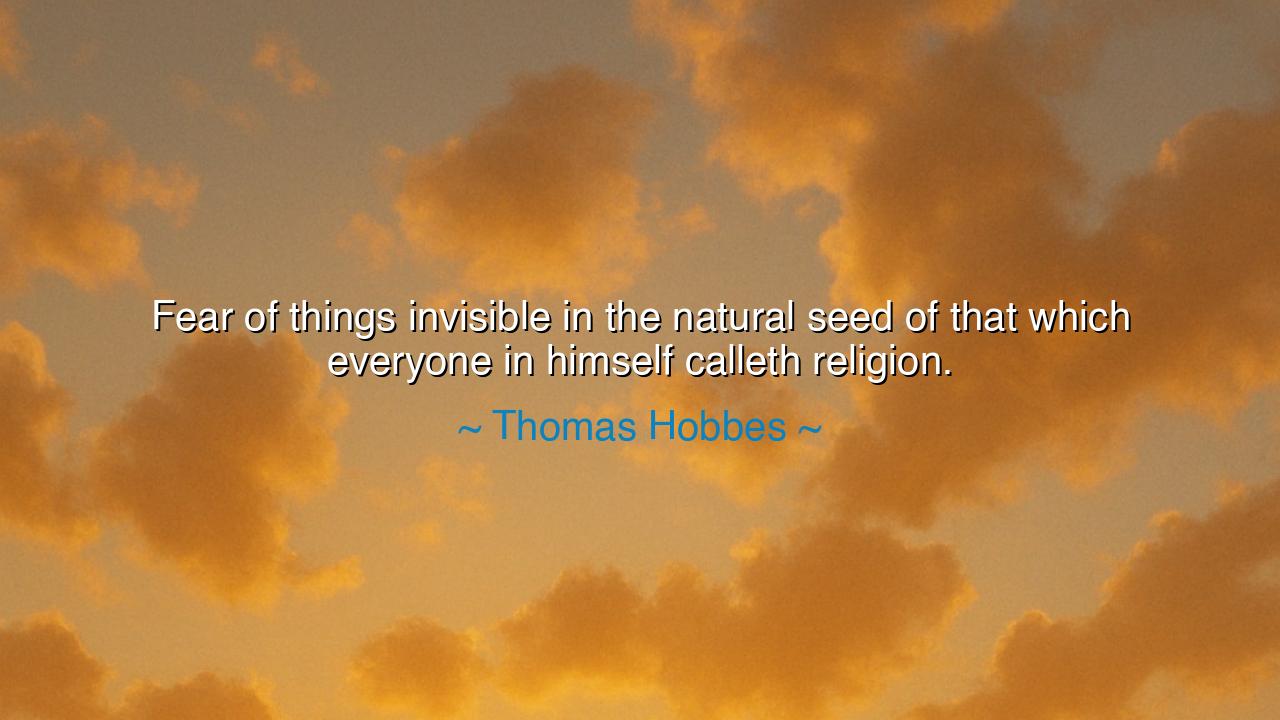
Fear of things invisible in the natural seed of that which
Fear of things invisible in the natural seed of that which everyone in himself calleth religion.






In the depths of the human heart, there exists a profound fear—a fear not of what we can see or touch, but of that which is beyond our understanding, that which lies hidden in the realm of the invisible. Thomas Hobbes, a great philosopher of the 17th century, offers us a striking observation: “Fear of things invisible in the natural seed of that which everyone in himself calleth religion.” With these words, Hobbes illuminates the origin of religion, suggesting that at its very core, fear of the unknown and unseen is the driving force that gives rise to religious belief. This is no mere reflection on superstition, but a deeper look into the essence of human nature and its relationship with the divine and the supernatural.
Hobbes speaks of a natural seed, the very beginning of that which we recognize as religion. It is within the soul of every individual, he suggests, that a fear of invisible forces—whether gods, spirits, or fate—takes root. This fear is not born of tangible threats, but of the vastness of the unknown. It is the fear of what cannot be seen, touched, or fully understood—those mysteries that lie beyond the reach of human senses and reason. Religion, in this sense, is a response to the human need for certainty in the face of that which is beyond our comprehension. It is a way to bring order to the chaos of the unknown, to seek comfort in the belief that there is a higher power that watches over us.
This fear of the invisible is an ancient and enduring force that has shaped human history. From the earliest civilizations, man has sought to understand and control the unseen forces of nature through rituals, prayers, and sacrifices. In the heart of the ancient Egyptians, there was the fear of the gods who controlled the forces of life and death. To appease them, they built grand temples and offered rituals to ensure the favor of the divine. Similarly, the Greeks and Romans looked to their pantheon of gods, not only for guidance but for protection from the invisible forces that governed the universe. Their fear of these unseen powers was deeply ingrained in their religious practices, shaping the way they viewed their world and their place within it.
But this fear of the invisible is not confined to ancient peoples; it persists in the modern world, often under the guise of faith and spirituality. Christianity, for example, arose in part from the fear of the invisible God, the creator of all things, whose will shaped the lives of men. Even today, individuals pray to be delivered from unseen forces—whether they be illness, misfortune, or existential doubt—believing that only divine intervention can protect them. In this way, Hobbes' insight remains strikingly relevant: religion is, at its root, a response to the fear of what cannot be seen, a way of confronting the unknown with the belief that there is meaning and purpose beyond the visible world.
Consider the story of Joan of Arc, a woman who, driven by visions of the divine, led an army to battle against overwhelming odds. Her faith was rooted in a profound fear and reverence for the invisible, the voices she believed to be those of saints directing her every step. Joan’s fear of the unknown, and her belief in the guidance of divine forces, led her to perform incredible feats of courage and conviction. Her life is a testament to the power of religion as both a comfort and a source of strength in the face of an unseen, unknowable universe. For Joan, religion was not merely a belief in higher powers; it was a way of navigating the vast fear of the invisible forces she felt surrounding her.
In Hobbes' view, this fear of the invisible is not merely the foundation of religious belief, but the very thing that sustains it. Religion persists because of the mysteries it attempts to explain—mysteries that bring comfort to the fearful heart. Yet, Hobbes also warns us of the dangers of this fear, for it can lead to superstition, exploitation, and tyranny. When religious beliefs are driven by unfounded fears, they can be manipulated by those in power to control the masses, to bend them to a particular will under the guise of divine authority. Religion, if not tempered by reason and critical thinking, can become a tool of oppression rather than liberation.
The lesson from Hobbes is one of reflection and awareness: religion, while born from a natural and deeply human fear of the invisible, must be practiced with wisdom and discernment. It is not enough to accept beliefs simply because they offer comfort or security. We must engage with the mysteries of life and death not as tools for controlling others, but as a means of personal growth, understanding, and compassion. We must approach the unknown with curiosity, not with blind fear, and seek truth in ways that enrich our understanding of ourselves and the world around us.
So, let us embrace the fear of the invisible not as something to be hidden or denied, but as a spark for deeper reflection and connection. Let our faith guide us toward peace and clarity, but let it also be a force for freedom and understanding, not for division or domination. In this way, we can transcend the natural seed of fear and cultivate a religion that is both rooted in love and grounded in truth, one that helps us face the mysteries of life with both courage and grace.






AAdministratorAdministrator
Welcome, honored guests. Please leave a comment, we will respond soon